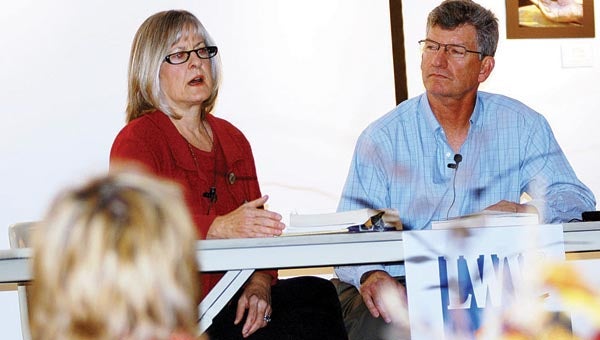State Rep. skeptical of apple farming future
Published 11:31 am Monday, October 21, 2013

Janet and Bob Schuttler share their experience running a cattle farm in Three Oaks. Leader photo/CRAIG HAUPERT
Four southwestern Michigan farmers provided insight into the agriculture business during the League of Women Voters of Berrien and Cass Counties’ noon luncheon Friday at Fernwood Botanical Garden and Nature Preserve.
Speaking at the panel were State Rep. Dave Pagel, owner of Pagel Orchards in Berrien Springs; Joel Layman, of Dowagiac, owner of Layman Farms; and Janet and Bob Schuttler, owners of Middlebrook Farm in Three Oaks.
While all four are farmers, each have very different operations.
Pagel grows, packages and markets apples. Layman farms a couple thousand acres of mostly corn and soybeans, while the Schuttlers raise lowline Angus cattle.
The farmers all had unique stories to tell.
Janet and Bob Schuttler
The Schuttlers had zero farming experience before opening a small family farm in Three Oaks where they raise 100 percent grass-fed cattle for beef and breeding. They don’t use chemicals on their land and they don’t subject their cattle to hormones or antibiotics for growth.
The Schuttlers said their customers don’t necessarily care if they are certified organic.
Instead, the couple said customers care about who the Schuttlers are as people and how they raise their cattle. Janet said the term organic has lost value because it is confusing and no one really knows what it means.
The Schuttlers said there is a general lack of education about agriculture. They believe there is a need for more educational opportunities for people wanting to start small farms, like theirs.
They said they chose to go into this line of business knowing they would make less money in exchange for doing something meaningful.
Joel Layman
Layman comes from a family of row-crop farmers.
He believes crop insurance is extremely important as a safety net, especially during times of extreme drought. Layman said he harvested just 25 percent of a crop because of last year’s drought. Without crop insurance, Layman said the region would’ve seen many more foreclosures and bankruptcies.
Layman said the country would see an increase in the consolidation of farms for several reasons, including an aging population of farmers and farm owners. He said the average age of a farmer is 60 years old and there aren’t enough young people interested in farming.
Layman cited several benefits of the use of Genetically Modified Organisms (GMOs) in farming, including an overall reduction in the use of pesticides and fertilizers. He said GMOs help feed millions of hungry people. While Layman said he couldn’t guarantee GMOs are safe, he said no one could prove they are unsafe.
Dave Pagel
Pagel’s family has a long history in tree farming.
He said last year’s early spring resulted in a harvest of 4 to 5 percent of a regular crop of apples at his farm. However, the apple harvest this year is at record levels.
Apple farming is highly competitive and risky, he said. In order to be successful, the farmer said he has to anticipate what variety of apples will be popular years in advance. It is also vital to effectively market the apples.
“You better have a plan to get it sold if you plant it,” he said.
Labor is becoming a big issue in apple farming, Pagel said, as less migrant workers came to Michigan this year for “whatever reason.” He said hiring local people to make up for the shortfall doesn’t work based on his past experience. He said our society needs to develop a deeper appreciation of and place a higher value on migrant labor.
Pagel is skeptical of the future of apple farming in southwest Michigan due to climate change. He said the area is warmer than it used to be, which has led to changes in weather that make it more risky for apple farmers.






